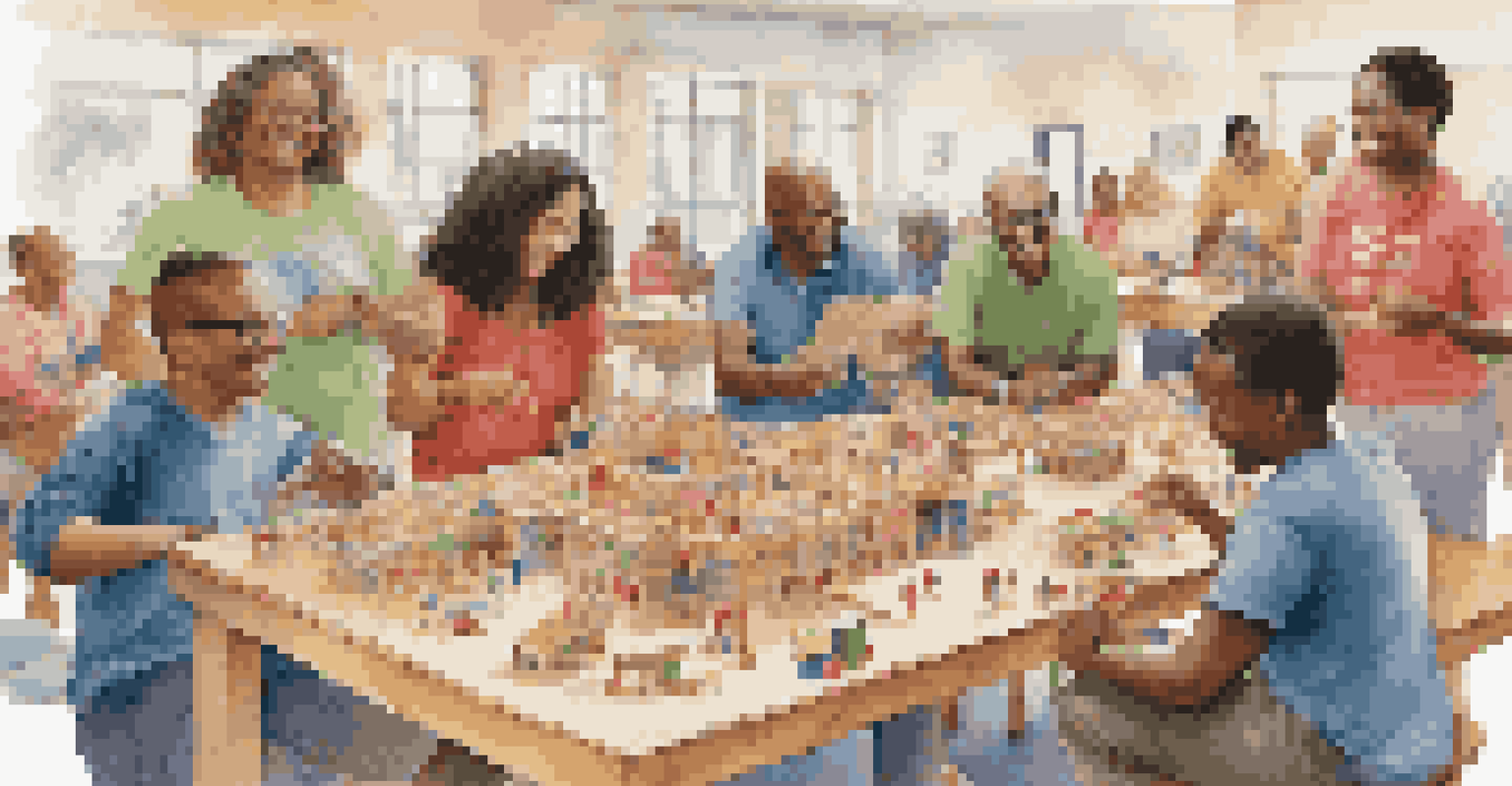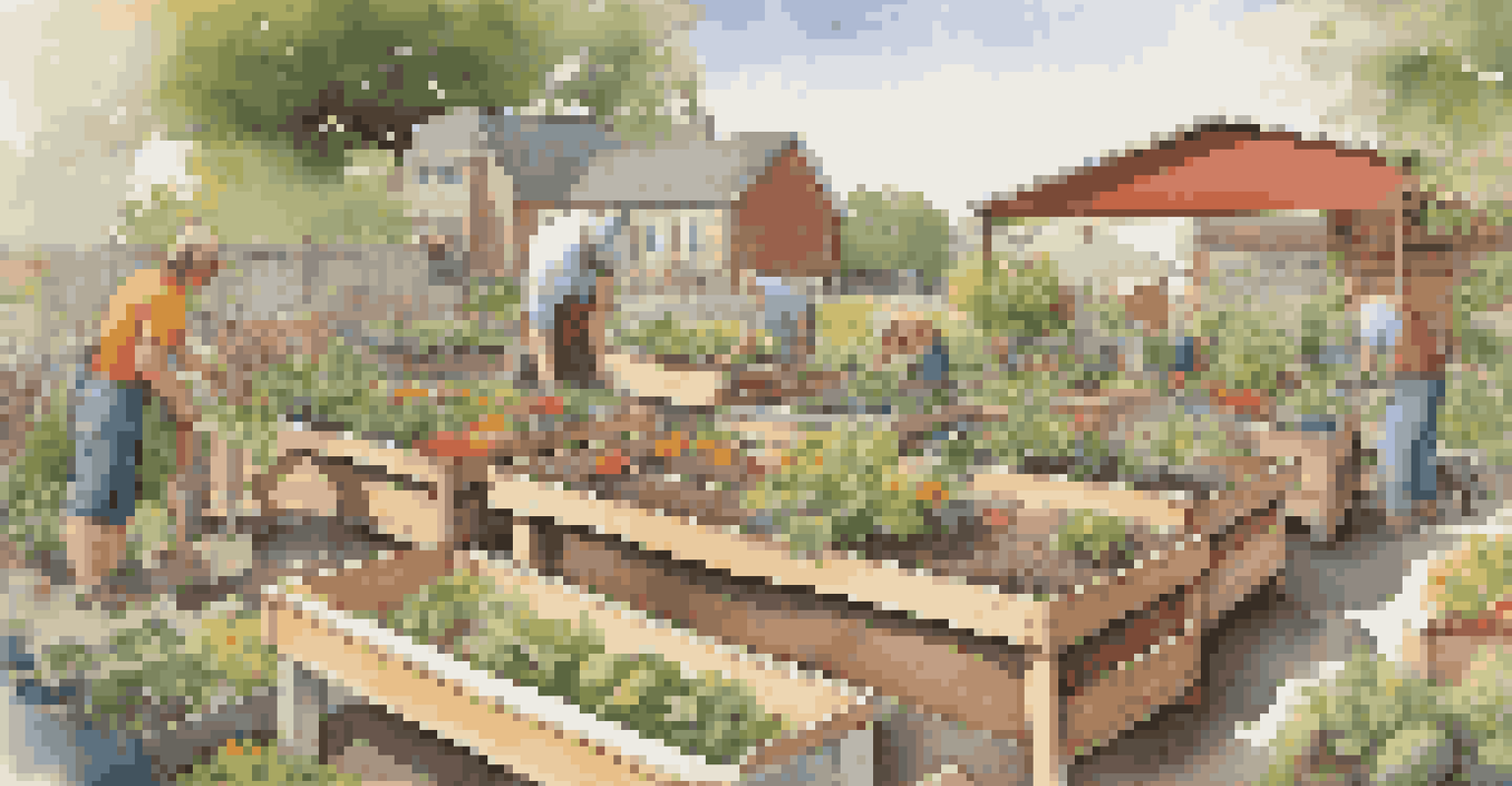Woodworking for Charity: Projects That Make a Difference

Understanding the Impact of Woodworking for Charity
Woodworking for charity is more than just crafting beautiful items; it's about making a tangible difference in the community. By using your skills and creativity, you can create projects that serve those in need, from children to the elderly. This practice not only benefits others but can also be incredibly fulfilling for the woodworker, creating a sense of purpose and connection.
The best way to find yourself is to lose yourself in the service of others.
Imagine crafting a simple toy or a piece of furniture for a family that lost everything in a disaster. These acts of kindness can help restore hope and bring joy to those who are struggling. It’s a beautiful way to channel your passion for woodworking into something that has a lasting impact.
Moreover, woodworking for charity often fosters a sense of community. Whether it's joining local groups or participating in fundraisers, these activities can connect you with like-minded individuals who share your values and interests. Together, you can amplify your efforts and make a bigger difference.
Essential Tools for Charitable Woodworking Projects
Starting your charitable woodworking journey doesn't have to be overwhelming, but having the right tools can make a world of difference. Basic hand tools like saws, chisels, and hammers are essential for creating a variety of projects. If you're looking to invest, consider adding a power drill and a jigsaw to your toolkit for more complex designs.

It's also important to have safety gear on hand, such as goggles and gloves, to protect yourself while you work. Safety should always be a priority, especially when you're focusing on creating for a greater cause. Remember, the goal is to help others while also ensuring you stay safe and healthy.
Making a Difference in Community
Woodworking for charity allows individuals to create meaningful projects that directly benefit those in need.
In addition to physical tools, having a well-organized workspace can enhance your productivity. Keeping your area tidy and stocked with necessary supplies will help you focus on your projects. A clutter-free environment allows creativity to flow, making it easier to bring your charitable visions to life.
Simple Woodworking Projects for Beginners
If you're new to woodworking, starting with simple projects can help build your confidence. Consider making birdhouses, which are not only fun to create but can also provide a home for local wildlife. These small projects require minimal materials and can be completed in a short amount of time, making them perfect for beginners.
We make a living by what we get, but we make a life by what we give.
Another great beginner project is crafting wooden toys. Simple designs like blocks or pull-along toys can bring joy to children in need. Plus, these items can often be made from scrap wood, making them an affordable option to give back.
Finally, you can try making small furniture items, like stools or shelves, which can be donated to shelters or community centers. These projects can provide essential resources for those in need while allowing you to practice your woodworking skills in a meaningful way.
Intermediate Projects That Make a Difference
Once you've honed your skills with beginner projects, you might want to take on something a bit more challenging. Consider building garden boxes for community gardens or schools. These boxes can help promote sustainable living and provide fresh produce for those in need, creating a ripple effect of positive impact.
Another intermediate project could be crafting furniture for local shelters. Items like tables, chairs, or even bed frames can greatly improve the living conditions for those seeking refuge. It’s rewarding to know that your craftsmanship can enhance someone’s daily life in such a tangible way.
Essential Tools for Success
Having the right tools and a well-organized workspace is crucial for effectively executing charitable woodworking projects.
Additionally, you might think about creating custom memorial items for families who have lost loved ones. Simple wooden plaques or urns can serve as a beautiful tribute to those who have passed, offering solace to grieving families while allowing you to use your skills compassionately.
Collaborating with Local Charities and Organizations
One of the most rewarding aspects of woodworking for charity is the opportunity to collaborate with local organizations. Many charities are often in need of handmade items, so reaching out can lead to meaningful partnerships. These collaborations can amplify your impact and help you connect with those who share your mission.
Consider hosting a workshop where you teach others to make simple projects for charity. This not only spreads awareness but also engages the community in your cause. You can build a network of fellow woodworkers who are passionate about giving back, creating a supportive environment for everyone involved.
Additionally, local charities may have specific needs that you can fulfill. From crafting toys for children’s hospitals to building furniture for community centers, understanding their requirements can help guide your projects. This tailored approach ensures that your efforts are truly making a difference where it’s needed most.
Promoting Your Charitable Woodworking Efforts
After completing your charitable projects, sharing your work can inspire others to get involved. Use social media platforms to showcase your creations and the positive impact they have made. By sharing your journey, you can engage a wider audience and encourage them to explore their own charitable woodworking opportunities.
Consider writing blog posts or creating videos detailing your projects and the stories behind them. This not only highlights your skills but also raises awareness about the causes you're supporting. Storytelling can be a powerful tool to connect with others and motivate them to join your efforts.
Building Community Connections
Collaborating with local charities and engaging with others can amplify the impact of your woodworking efforts.
Lastly, attending local craft fairs or community events can be a great way to promote your work. Set up a booth showcasing your projects and share information about the charities you support. This face-to-face interaction can foster community involvement and inspire others to contribute to charitable woodworking initiatives.
The Lasting Benefits of Woodworking for Charity
Engaging in woodworking for charity not only benefits those in need but also enriches your own life. The sense of fulfillment that comes from knowing your work has helped others can be incredibly rewarding. This emotional payoff often leads to greater satisfaction in your craft and a desire to continue giving back.
Moreover, charitable woodworking can enhance your skills. As you take on different projects, you learn new techniques and improve your craftsmanship. This continuous growth can open up opportunities for more complex projects in the future, keeping your passion for woodworking alive.

Finally, the connections you make through charitable work can lead to lasting friendships and a sense of community. By working towards a common goal, you build relationships with fellow woodworkers and those you help. These connections can transform your woodworking journey into a fulfilling and enjoyable experience.